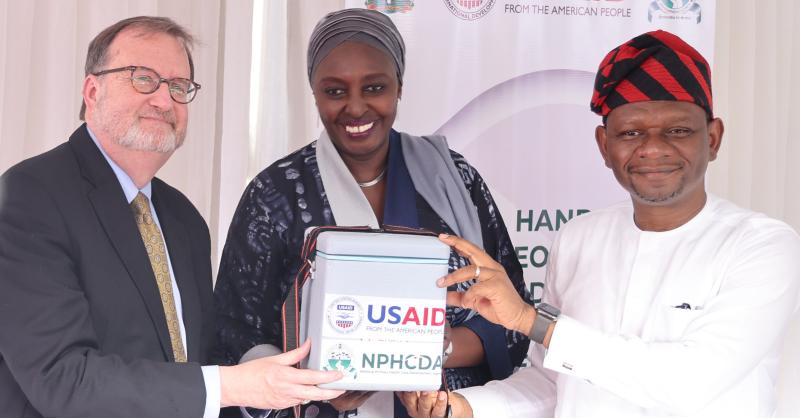The Federal Government of Nigeria has received a generous donation of 10,000 doses of the Mpox vaccine (formerly Monkeypox) to support its efforts in containing the outbreak of the infectious disease.
Speaking at an event to hand over the vaccines to the National Primary Healthcare Development Agency (NPHCDA),Ambassador Richard Mills explained that the United States Government’s action was aimed at providing timely vaccines to the affected areas across the country and those who are most vulnerable to Mpox infection.
”We are pleased to know that this is a timely donation that will reach the affected areas across the country and those who are most vulnerable to Mpox infection.
”We encourage the Government of Nigeria to continue to mobilise domestic resources to secure more vaccines to combat Mpox,” he said.
The Federa Government has prioritised five states (Bayelsa, Edo, Cross-River, Lagos, and Rivers) with the highest burden of Mpox cases.
The vaccines will be given to those most at risk of Mpox including close contacts of Mpox cases and frontline healthcare workers with a provision for reactive vaccination in other states as the need arises.
Asked on the safety of the vaccine, Ambassador Mills said, “Yes, the vaccine is safe. Safety tests have been conducted during clinical trials, and the National Agency for Food and Drug Administration and Control reviewed the results of these trials before granting approval for the use of the vaccines in Nigeria.”
He further assured the government that the USAID will continue to provide technical support and collaborate with the government of Nigeria to improve prevention, preparedness, detection, response, and resilience to infectious disease outbreaks.
“USAID is also supporting the government of Nigeria with strengthening primary health care and routine immunisation systems as well as supporting overall systems strengthening including health, education, nutrition, governance systems, and the rule of law.”
Also delivering remarks at the event, the Coordinating Minister of Health and Social Welfare, Prof. Ali Pate, who was represented by the Permanent Secretary, Mrs Kachollom Daju, thanked the United States Government’s gesture, assuring that the vaccine will be immediately deployed for use.
He reiterated the federal government’s commitment to improving the well-being of Nigerians.
“This is a spirit of cooperation and collaboration through the years, and this vaccine will be of great help to us. The Federal Ministry of Health understands the importance of having a healthy nation, so all the policies that we implement and the collaborations are focused on ensuring our citizens’ health.
“Thank you for the 10,000 doses, and we look forward to receiving more. I also want to thank our development partners, USAID, PEPFAR, WHO, UNICEF, and all the UN organisations. Your collaboration is greatly appreciated, and this will significantly aid those in need.
“We all recognise the size of our population, and we must ensure that we address every disease, especially those that pose public health concerns. On this note, I would like to extend our gratitude,” he added.
Mpox is a rare viral zoonotic infectious disease (i.e. an infection transmitted from animals to humans) that occurs sporadically, primarily in remote villages of Central and West Africa, near tropical rainforests. It is caused by the Mpox virus, which belongs to the Orthopoxvirus genus in the family Poxviridae.
The Orthopoxvirus genus also includes the variola virus (the cause of smallpox), the vaccinia virus (used in the smallpox eradication vaccine), and the cowpox virus (used in earlier smallpox vaccines). Following the eradication of smallpox, the Mpox virus has emerged as the most significant Orthopoxvirus.

